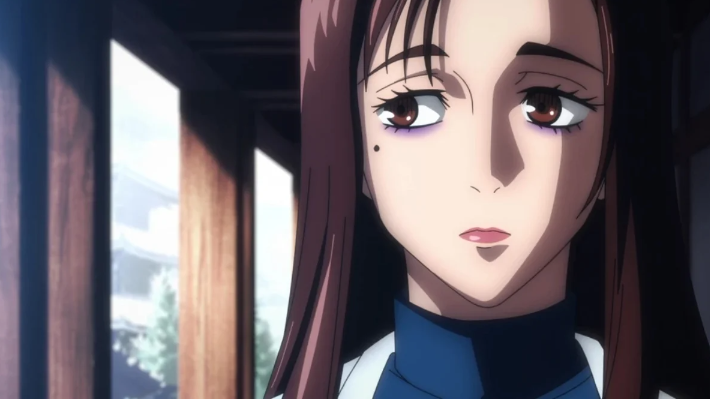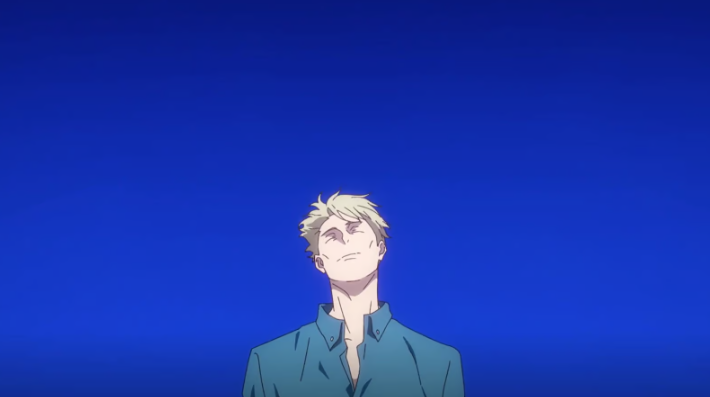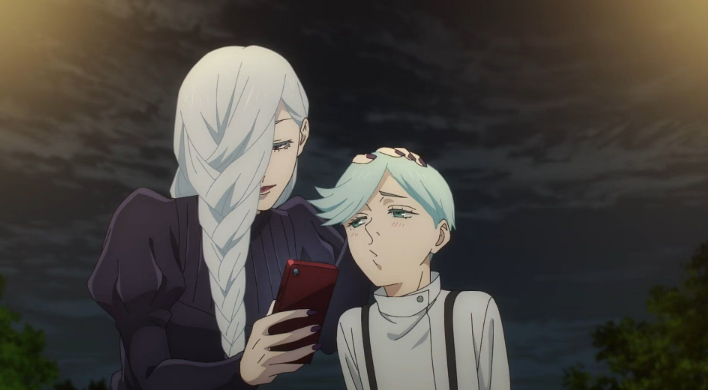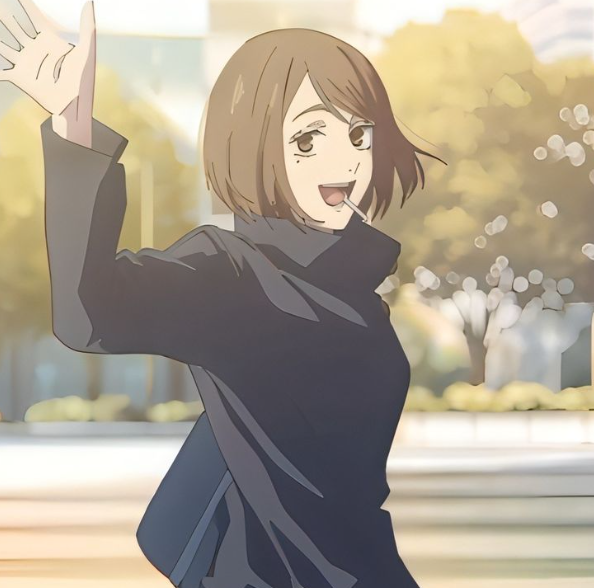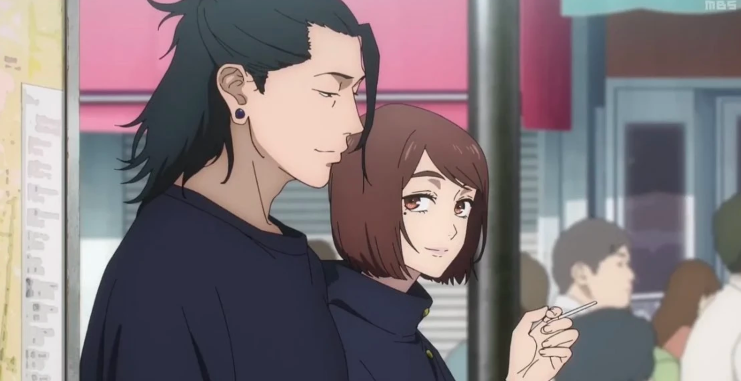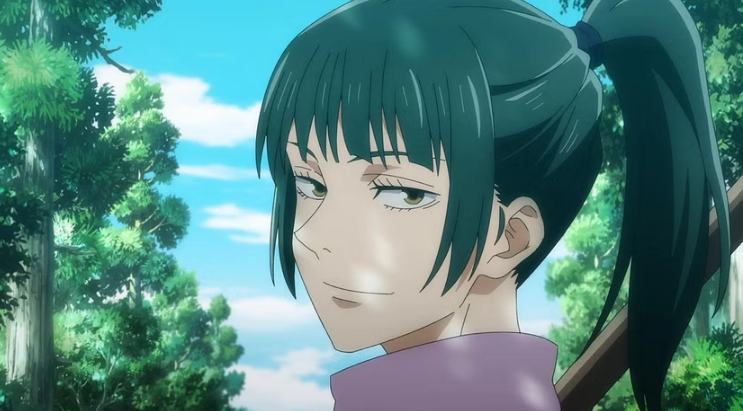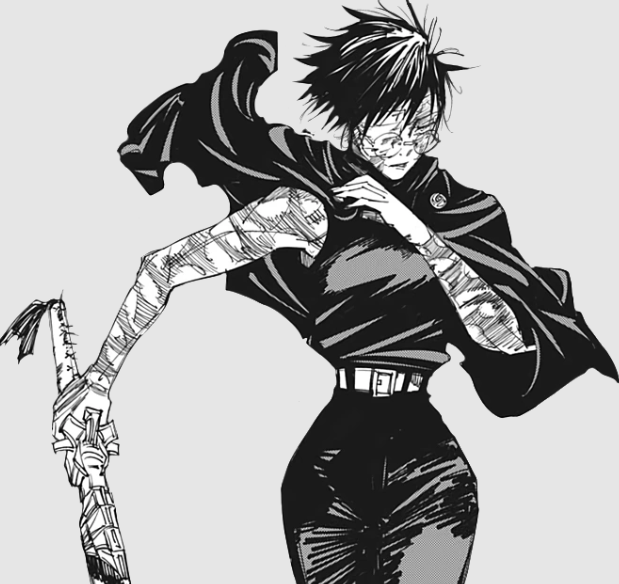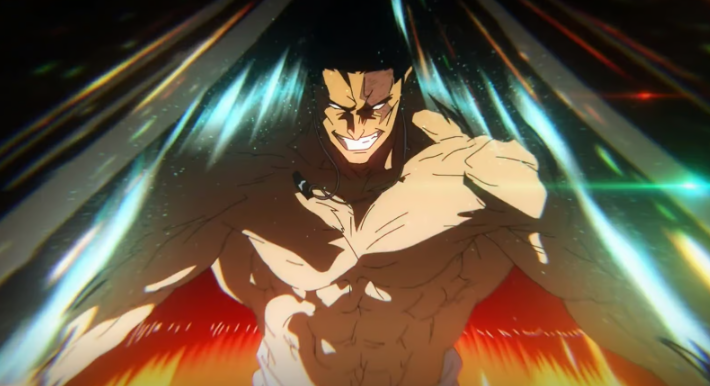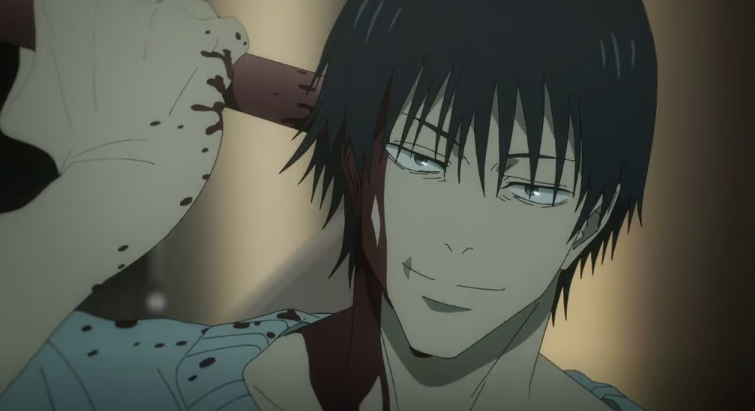The women Gege left behind
[contains spoilers]
I did not expect to do a Jujutsu Kaisen essay because I did not think I cared about it enough, and most of my passion for this series is connected to hot sexy Satosugu AU fan content, however, I have been contemplating a lot about Jujutsu Kaisen in the wake of Season Two’s overwhelming success; the things about the story that always bugged me, and the parts that leave me deeply intrigued, forced to reimagine scenarios for lack of narrative content. Mainly, I think about the women left behind.
I was inspired to write this after an interview quote from Gege went viral on twitter:
I don’t care who dies, as long as it makes the story interesting. It doesn’t matter how dark it gets
This obviously led to a lot of discussion, as it implies that the shock and horror of character deaths take precedent over quality storytelling, and in Shibuya, this is felt plainly. The only character’s death that has a true impact is Nanami’s, who, after entering the story as a jaded misanthrope, sacrifices his life for others, abandons his dream of retiring in sunny Malaysia having only lived for himself, and finally, passes the torch to Yuji, imbuing him with a new hope. It is a sad yet fitting conclusion.
Still floored by the beauty of this sequence. The anime really elevated the manga’s emotional scenes.
By contrast, Nobara had much more to give: her initial battle in Shibuya is disappointing, and so, ready to redeem herself, she flexes her technique as the perfect foil to Mahito’s—only to die immediately afterwards. Her death then becomes a device for Yuji’s breakdown, and as a fan, you feel cheated about the things Nobara could have done. Her death didn’t really enhance the story, it was just a shocking moment to emphasise the darkness of the arc. And squeezing in a quick childhood flashback to harden the blow is a bit cynical and forced.
Characters fall like flies all over Shibuya, and Gege’s quote truly does reflect how the story has developed ever since. Characters interact superficially with each other and the plot itself now. There is no breathing room given to the fallen of the previous arc, everyone moves quickly onto Kenjaku’s Culling Game, slicing and dicing through opponents with reckless abandon, and then Gojo reappears as his usual arrogant self, only offering faint words about Nanami. Nothing about Nobara or the thousands of humans who died. He does not even lament the state of Geto’s body. It’s just weird to me.
And…we never saw her again.
I discussed Gege’s quote with a few friends online and we considered the ways that keeping a character alive can still be impactful, that death isn’t the only way to make a story interesting. Gege has already provided such characters, mainly women, and I think they are notable. So whilst this title might suggest a criticism for how Gege powerscales women, or relegates their worth to background fodder (which many people have already discussed), I actually want to highlight the potential he has provided in the women he left behind: the ones he didn’t kill, but who bring something unique to the story with their preservation.
Mei Mei, everyone’s favourite sister, is a great analogue for life’s cruelty. She contradicts pre-villain Geto, who believed in protecting the weak and saw jujutsu sorcery as a life-saving gift. Geto shouldered the burden of this cause, sacrificing his comfort on behalf of humans who did not know he existed, and when those humans betrayed him, the floor crumbled beneath his feet and he was lost. Mei Mei does not have this problem because she cares about no one but herself. She is in this to make money. She wastes her potential on benign ventures, but her life is her own. Notably, nothing she does brings condemnation from the “higher ups”, and she is not flagged as a problem. She does the bare minimum for profit. And she is still alive because of it.
no comment.
During the Gojo vs Sukuna fight, her ability is useful to livestream the events, and she manages the betting pool for the outcome. Mei Mei serves a purpose in highlighting jujutsu society’s avarice, and she is also a cautionary tale: everyone who sought heroic altruism met an untimely end. She is a subtle background character, as even now, as the others risk their lives to stop the destruction of their society, she does nothing, simply watches to exploit the potential gains. It is easy to acknowledge Mei Mei and ask “is there any point to this at all”? However, she is the result of an already selfish society: why sacrifice herself for those who would never do the same for her? The environment cultivated by the higher ups has created Mei Mei. She lives for herself because she has to.
Similarly, Shoko nurses her own selfishness. In her school days, she actively took a backseat on missions. Geto and Gojo progressed to Special Grade status and she remained as a fixture of the school building, despite her invaluable gift of reversed curse technique. She is totally aloof when Geto returns after the massacre of the village and his parents, and promptly leaves before Gojo arrives to confront him. Considering these are both her friends, it is notable that she did not stay to implore Geto to reconsider his path. It is easy to write Shoko off as uncaring and despondent, but I wonder if her constitution is much deeper, more devastating than most people giver her credit for.
It doesn’t even seem RIGHT to see her this happy.
When we first meet Shoko, she is a baggy-eyed, haggard, monotone hermit. A chain smoker with two facial expressions. During Gojo’s flashback arc, she is easy going and happy. The contrast is shocking, and it forces us to acknowledge that jujutsu society has not been an easy existence, and actually, her current appearance is very similar to Geto’s after his year of quiet anguish following the Star Plasma Vessel incident. Today, Shoko is tired and empty.
This all comes to a head in chapter 220. In what is now an infamous line (especially within satosugu circles), Shoko watches as the latest crop of sorcerers excitedly brainstorm ways to retrieve Gojo. She has separated herself from the group and watches them soulessly. Her mind wanders to her school days, and her relationship with Geto and Gojo. After Geto’s death, Gojo promised he wouldn’t leave anyone alone. To this memory, Shoko argues:
I was in love with one of you… That’s something that would’ve never happened even if the world was turned upside down. But you idiot, who’s alone? I was there all along.
It is a heartbreaking admission. Up till this chapter, Shoko is easy to miss. Watching anime-only reactions to the start of Season 2, a lot of people excitedly respond to the younger versions of the characters: “Mei Mei! Gojo! Geto!” When the camera pans to Shoko, they all say “And…this girl!” Shoko is not a memorable character. Readers are directed to the tragedy of Geto’s villainy, and the burden placed on poor Gojo to witness his “one and only” go off the rails. We despair knowing that Gojo was tasked with killing Geto, and the lonely path he tread as the strongest modern sorcerer. No one thinks about Shoko, how Geto was her friend too, that she might feel immense guilt for not checking in on him when he was suffering. I am not sure who Shoko was in love with, but if it was Geto, it means that the love of her life was executed by her best friend, and he prior spent his final years surrounded by cult fanatics, far away from her watch. She is a tragic and devastating character.
On a positive note, shokosugu has an entry in the shipping wiki, so all’s not lost for them in the alternate universes.
I believe her silence is an intentional decision by Gege, as it makes the above quote more striking. She has been omitted from the story, only to return with an emotional grenade. Two little panels, still hotly discussed and examined by keen readers as to their meaning. After Gojo’s demise, we do not see her reaction. She is absent from the post-fight planning meeting. But her shadow is on the narrative now. She was the first person I thought about after that battle: Yaga, Nanami, Yabara, Geto, Yuki, and now Gojo are no more. Almost everyone that had meaning for her is gone, and all her immediate school friends are dead. Where does this leave her? “You idiot” indeed: it’s Shoko who is alone.
Mei Mei and Shoko reveal the nuances of selfishness. Both have prioritised their lives, but whereas Mei Mei has cast away her empathy for a life of indulgent decadence, Shoko has preserved herself out of protection: proximity to feelings, to intimacy and friendship, means the separation meted by death will be felt much more acutely. But she has still suffered for this selfishness, and continues to lose her loved ones. Shoko does not maintain a life of quality, it is an existence of absences. Whereas Mei Mei lives, Shoko survives. Here is another cautionary tale: jujutsu society is filled with heartbreak.
The last woman left behind is a bit controversial, because there are aspects of her character growth that I love, but I also consider her to have untapped potential. A key moment of her awakening is wrapped up in the introduction of two unknown comedy characters who (at the time) had no other impact on the story, and I wanted her to have so much more. But Maki’s survival is both devastating and inspiring all the same. She embodies both elements of Mei Mei and Shoko, choosing selfishness and self-preservation to live a life that is at once indulgent and depressing.
As the failures of the Zenin clan, Maki and her sister Mai are abused and vilified. We don’t see much of the Zenins until after Shibuya, as the clan heads discuss the leadership following Naobito’s death. Maki arrives on the scene and is promptly dealt with by her father, who locks both sisters away in the same room Toji was once subjected to, in order to kill them. Mai sacrifices herself for Maki, using the last of her strength to enhance her sister’s abilities. With Mai gone, Maki’s heavenly restriction is finally completed, and she reaches the same state as Toji. Maki has been left behind, and now she faces the clan that hated her, subjected her to misogynistic abuse. She avenges the tragedy of her life by slaughtering the clan, leaving Megumi as the new leader.
She does look very cool now. Cool and broken.
Maki has not been the same since her transformation. It is chilling to see: she was always a serious character, but she had personality and charm, and considering her only equal is Toji, she is without his charisma (there is a reason Toji has such a passionate fanbase; he is absolutely magnetic). She does not smile, and is marked with the severe burns of Dagon’s attack. Every action she performs is in defiance of her experience with the Zenin clan, and when she confronts Naoya for the second time, it is a tense and uncomfortable battle—it’s more than her life on the line: Maki is redeeming Mai, she is defeating the horrors of the clan, and with it, the nonsensical hierarchy of jujutsu society.
Maki is no longer altruistic, and there is no space in the story for her to fight for a cause; it is about her: her awakened strength, her honour, and her inevitable quest to find some meaning now that the source of her ire is gone. What does she do now? The Zenin is no more, the Kamo clan has been compromised, and the Gojo family is irrelevant. The jujutsu world hangs in the balance thanks to the madness of the culling game. There is a risk of Maki becoming background noise, and not in the thoughtful, Shoko way, but more like a Useless Miwa or an “Inumaki? Who’s that?” way. I can only hope that Gege gives her a new purpose now that the story is shifting once more.
I genuinely wonder if Gege forgot about this one. His mentor came, fought, and died and we’ve heard nada.
I think these three characters are great examples of how to keep a life and give it narrative meaning, instead of killing for the thrills. A premature death can leave a gaping hole of dissatisfaction if done without care or skill. Conversely, it is impossible for every character to have an amazing fight, or have a huge influence in the story, but they can still impact the narrative. With Mei Mei, Shoko, and Maki, we can see the power of quiet influence: the careful unfurling of their stories and character arcs, how they interact with other characters and events, and the results of these interactions—all masterfully written.
Despite the hype of this series, my favourite parts of Jujutsu Kaisen all take place outside the fighting: Toji vs Gojo is great, but Gojo’s maniacal demeanour intrigues me more. Megumi vs Toji is exciting, but Toji’s final moment of clarity, and how that clarity triggers a memory of his true feelings about Megumi, and how he uses this clarity to kill himself so as not to murder the child he had sacrificed, but only after confirming Gojo’s kept promise, breaks my heart.
It’s the smile. It’s the “I’m glad”. It’s the human eyes. It’s the sad music. It’s the echo of his wife’s voice telling him to look after Megumi. It’s the fact HE named Megumi and Megumi means blessing. TEARS bro.
Geto’s fight with Jujutsu High has a lot of thrills and amazing sequences, but nothing will compare to his careful, muted unravelling, how we are forced to watch a noble, empathetic young man succumb to darkness after dragging himself through a hollow existence for over a year, and how he strayed from the path of his best friend without that friend even noticing his plight.
And more: Gojo chastising Megumi for not using his full potential, Nobara encouraging Yuji’s school friend to shoot her shot, Yaga’s bittersweet favour for Kusakabe, Gojo’s genuine frustration after Yuji’s “death”. All are perfect examples of Gege’s considerate character writing—they are moments that prove he obviously knows how to craft a compelling narrative, so it would be a shame to reduce this story to death and horror for the sake of making things interesting.
Prior to Culling Game, I felt that there was a healthy balance of character writing and action, but these days I think the action has eclipsed the meaningful moments. However, the existence of these three characters suggests an opportunity for their arcs to rejoin the main story. I hope that one day, they receive a conclusion. I imagine their journeys will be paved with tragedy of some kind, but they deserve a final destination all the same. I want to witness the result of their shared selfishness, and reach my own conclusions about what this means for the cruel and merciless society in which they live.
